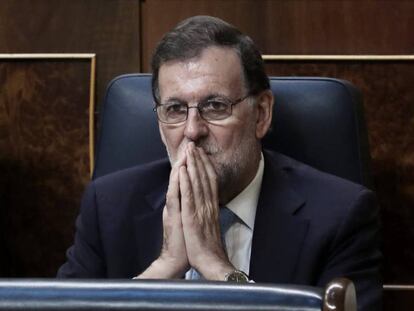Ciudadanos keeps the initiative in talks to form government
Talks on Wednesday could leave Socialists marginalized by refusal to talk with interim PM

Albert Rivera, the leader of the minority Ciudadanos party, has said he will negotiate with his 32 deputies in Congress to support Mariano Rajoy’s bid to form a government if the interim Prime Minister is prepared to accept six “essential” measures and one condition.
Nearly six weeks after Spain held a repeat election to pull out of a protracted deadlock produced by the previous election in December, both of which were won by Rajoy’s Popular Party (PP), the interim PM has been accused by Ciudadanos and the Socialists (PSOE) of refusing to yield on any significant issue that might secure him some support.
Even with Ciudadanos’ support, Rajoy would still be seven seats short of the majority he would need in the first round of voting at an investiture debate
Rivera and Rajoy meet on Wednesday to discuss Ciudadanos’ demands: Rajoy must set a date for his investiture debate in Congress, expel party officials targeted in corruption investigations, end judicial privileges for elected officials, change the electoral law, end amnesties and pardons in corruption cases, limit the prime minister’s mandate, and create a parliamentary commission to look into the so-called Barcenas case involving illegal cash payments to PP officials.
Even if Rajoy agrees to these conditions, he will still need the support of the Socialists and the regional parties to form a government.
Rajoy, whose PP obtained 137 seats at the repeat election of June 26, needs 176 for a congressional majority. If he bids for reinstatement and fails to obtain this figure, there would be a run-off in which the PP would only need more yes votes than no votes. In this event, an abstention from other parties would be sufficient.
Meanwhile, Socialist leader Pedro Sánchez risks being left on the sidelines as Rivera takes the political initiative. Former Socialist premier Felipe González, who served four successive mandates between 1982 and 1996, has called on his party to allow Rajoy to form a government.
The 36-year-old Rivera, a former member of the PP and who has led Ciudadanos since it was set up in 2006, has described Sánchez as having “turned his back on Spain” and who has “disappeared politically”, and who “cannot be counted on regarding affairs of state.”
Both Rivera and Rajoy have called on Sánchez to agree to abstain at an investiture debate.
“If the PSOE doesn’t want to play its role in affairs of state, then we will. We prefer to be useful than to see ourselves as important. At this time, it is more useful to be at the service of the Spanish people and to unblock things than to insist simply on saying no,” said Rivera, who during the election campaign had repeatedly said he wanted Rajoy to stand down as leader of the PP.
Sign up for our newsletter
EL PAÍS English Edition has launched a weekly newsletter. Sign up today to receive a selection of our best stories in your inbox every Saturday morning. For full details about how to subscribe, click here
While Ciudadanos walks back from its electoral strategy and moves closer to the PP, the Socialists are insisting they will not support Rajoy’s efforts to form a government. Even with Ciudadanos’ support, Rajoy would still be seven seats short of the majority he would need in the first round of voting at an investiture debate, and a simple majority in the second round. He wants the Socialists’s support in that second round, and believes that the party would be unable to resist the pressure to do so if he already has Ciudadanos’ backing.
Last week, Rajoy described his meeting with Rivera as “the first step on a long walk”. Today he has the opportunity to make a decisive move. If he accepts Rivera’s conditions, then a government could at last be in sight for Spain.
Englsh version by Nick Lyne.
Tu suscripción se está usando en otro dispositivo
¿Quieres añadir otro usuario a tu suscripción?
Si continúas leyendo en este dispositivo, no se podrá leer en el otro.
FlechaTu suscripción se está usando en otro dispositivo y solo puedes acceder a EL PAÍS desde un dispositivo a la vez.
Si quieres compartir tu cuenta, cambia tu suscripción a la modalidad Premium, así podrás añadir otro usuario. Cada uno accederá con su propia cuenta de email, lo que os permitirá personalizar vuestra experiencia en EL PAÍS.
En el caso de no saber quién está usando tu cuenta, te recomendamos cambiar tu contraseña aquí.
Si decides continuar compartiendo tu cuenta, este mensaje se mostrará en tu dispositivo y en el de la otra persona que está usando tu cuenta de forma indefinida, afectando a tu experiencia de lectura. Puedes consultar aquí los términos y condiciones de la suscripción digital.











































